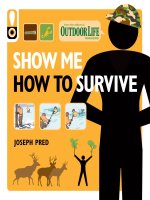Show Me How to Survive (Outdoor Life): The Handbook for the Modern Hero
Bạn đang xem bản rút gọn của tài liệu. Xem và tải ngay bản đầy đủ của tài liệu tại đây (37.06 MB, 20 trang )
SURVIVE
SHOW ME HOW TO
SHOW ME HOW
TO SURVIVE
THE HANDBOOK FOR
THE MODERN HERO
JOSEPH PRED
help after an accident
call for help
check a pulse
bolt from a wrist grip
escape from a choke hold
break out of a bear hug
deal with a burgled home
follow up after a burglary
perform cpr on an adult
do the heimlich maneuver
give cpr to a baby
save a choking baby
improvise an airway puncture
suture a wound
decompress a chest
stop bleeding
bandage a nasty wound
cauterize a wound in the field
save a toe
improvise a leg splint
wrap a sling
know your fractures
test for edibility
deal with a poisoned kid
identify natural poisonous foods
identify venomous insects
48
49
50
51
52
53
54
55
56
57
58
59
60
61
62
63
64
65
66
67
68
69
70
71
72
73
help
navigate the mean streets
stay safe in the wilderness
be prepared at the office
make a family emergency plan
stock an emergency kit
stock a bunker
prepare a flood dinghy
set up a panic room
bury a tornado shelter
make your home safe
prepare your pet
keep pets safe after a disaster
know animal warning signs
weather a hurricane
build a flood barrier
fill sandbags properly
firescape a yard
fight fire with an extinguisher
be prepared in a house fire
prepare for travel
stay smart abroad
protect against identity theft
burglar-proof a home
check a car before a trip
pack a car emergency kit
stay safe in a parking garage
get help for a boat in trouble
read storm clouds
boat safely in a storm
know your knots
sleep on the beach
pitch a snow camp
shelter in the jungle
camp in the desert
prepare for social collapse
prepare rugged venison jerky
preserve meat in a smoker
catch backyard game
hunt pigeons in the city
feed a family without a farm
get fit for the outdoors
clean a gun
store a gun
be safe at the range
disarm a shooter
keep from spreading the flu
pack a first-aid kit
1
2
3
4
5
6
7
8
9
10
11
12
13
14
15
16
17
18
19
20
21
22
23
24
25
26
27
28
29
30
31
32
33
34
35
36
37
38
39
40
41
42
43
44
45
46
47
protect
first
aid
home
safety
wilderness
skills
mark your trail
read animal tracks and scat
walk a straight line in the woods
navigate with your watch
stay on track in the desert
navigate out of a swamp
read the stars
find the equator in a forest
build a campfire
light a fire with chocolate
construct a fire drill
use a fire plank
purify water in green bamboo
boil water in a tree stump
collect water from fog
get water in the desert
signal an airplane
erect a quick tepee
assemble a debris hut
set up a shade shelter
build a swamp bed
dig a snow cave
survive an avalanche
prevent snow blindness
be avalanche aware
find an avalanche victim
make a fish trap
catch a fish bare-handed
go ice fishing
snare a hare
gut a hare
squash a squirrel
nab a fox
trap a rodent
impale an elk
be bear aware
fend off a mountain lion
save a child from a coyote
treat a snake bite
get jungle savvy
remove a botfly with bacon
prepare tasty snake meat
eat a scorpion
eat wild around the world
112
113
114
115
116
117
118
119
120
121
122
123
124
125
126
127
128
129
130
131
132
133
134
135
136
137
138
139
140
141
142
143
144
145
146
147
148
149
150
151
152
153
154
155
prevail
74
75
76
77
78
79
80
81
82
83
84
85
86
treat a bee sting
treat a jellyfish sting
make a ginger poultice
evaluate your medicine chest
remove a small fish hook
treat a blister
remove a splinter
remove an object from your eye
put out a clothing fire
halt an electrocution
avoid lightning on a mountain
identify burns
deal with a superficial burn
87
88
89
90
91
92
93
94
95
96
97
98
99
handle a chemical burn
help a seizure victim
recognize a heart attack
identify a stroke
treat hyperventilation
survive an asthma attack
soothe a mild allergic reaction
spot a severe allergic reaction
stop a nosebleed
free a frozen tongue
preserve a dislodged tooth
fill a cracked tooth
spot and treat a concussion
100
101
102
103
104
105
106
107
108
109
110
111
help a lost child
rescue a cat up a tree
rescue-breathe for a dog
protect a baby bird
rescue a swimmer in trouble
identify heat-related illnesses
treat heat exhaustion
help clean up an oil spill
clean an oiled bird
help someone out of an ice hole
treat frostbite
save a hypothermia victim
156
157
158
159
160
161
162
163
164
165
166
167
168
169
170
171
172
173
174
175
survive a shipwreck
use pants as a flotation device
find land when lost at sea
build a dugout canoe
pick a coconut
use coconuts
ace an emergency scuba ascent
escape a kelp forest
avoid a shark attack
fend off a shark
resist a wolf pack
battle a pit bull
spike an assailant
embrace your enemy
do a handshake takedown
deal with failed brakes
handle a hydroplaning car
weather a chemical spill
survive a snowbound car
improvise a signal mirror
95
167
45
As an emergency manager, I’ve advised individuals and organizations
on everything from minor problems such as stopping a nosebleed
(#95) to large-scale environmental challenges, like avoiding an
avalanche (#136). While writing this book, I was lucky to be
able to draw on my day-to-day professional experience with
life-saving procedures like CPR (#56), as well as my personal
interest in the challenges in the great outdoors, such as cleaning up
an oil spill (#107) . . . and a few problems I hope to never have to
deal with, like repelling an angry pit bull (#167). Through my research
in preparing this book, I learned a few new things that may prove useful
one day, such as keeping pets safe after a disaster (#12), how to fight
a shark (#165), or how to build a flood barrier with sandbags (#15).
In my line of work, you can never be too prepared, so although I hope no one will ever need them, I’ve
also included instructions for saving a child from a coyote (#149) and disarming a shooter
(#45). Stay safe out there!
a note from joseph
disarm a shooter
battle a pit bull
stop a nosebleed
151
104
To be truly prepared for any emergency, it’s
best to start getting ready now, before you
find yourself face-to-face with a mountain lion.
Start by packing a go bag (a kit containing
everything you’d need to get by for 48 hours
in an emergency). Include personal items like ID, food,
medicine, tools like a flashlight and knife, and other handy
survival items like a dust mask, a radio (with extra batteries),
and a list of emergency contact numbers.
Now that you have your physical needs handled, work
on your brain by practicing “situational awareness.”
Stay attentive to your surroundings, your wellbeing, the
presence of others, and possible dangers or threats. It isn’t
about looking for problems, it’s about avoiding becoming
complacent and making mistakes as a result.
For instance, imagine yourself hiking through an unfamiliar
jungle (#151). Without worrying or panicking, stay aware
of whether anyone in your party is tired, hungry, or injured.
Focus on the path ahead of you, while keeping a relaxed
state of awareness about your surroundings—watching for
predators, poisonous plants, and insects.
A positive, relaxed, open mindset also saves lives in the
field. Someone with a negative outlook might panic or give
up when faced with a swimmer in trouble (#104), but a
person who focuses on solutions will quickly scan the beach
for a rescue aid and jump in the water.
Ready for an adventure? Just keep these basic tenets of
great rescue work in mind as you read through the book
and you’ll be a hero in no time!
get jungle savvy
rescue a swimmer in trouble
2
1
1
3
3
5
2
2
4
4
6
1
3
5
4
6
154134 135 137136
111
111
CROSS-REFERENCES When one
activity just leads to another, we’ll
point it out. Follow the links for
related or interesting information.
how to use this book
MORE INFORMATION Follow
the * symbol to learn more
about the how and why of the
given step.
In the pages that follow, virtually every piece of essential information
is presented graphically. In most cases the pictures do, indeed, tell the
whole story. In some cases though, you’ll need a little extra information
to get it done right. Here’s how we present those facts.
Smooth, grassy slopes
without rocks or trees are
most dangerous.
Slopes of 30 to 45 degrees are
most likely to avalanche, but
even slopes of 25 to 60 degrees
can slide in certain conditions.
Everyone in your party should car ry an
avalanche beacon. Should you lose someone
in an avalanche, you can use your beacon to
hone in on the radio signal emitted by the
victim’s beacon and find them quickly.
A heavy, compacted layer of
snow resting on a powdery
layer is highly unstable.
Snow debris and broken trees
indicate previous avalanches—be
wary of repeat slides.
Avoid avalanche-prone areas in the
forty-eight hours after rough weather
or a thaw. If you must go, pack a
collapsible shovel, a snow probe,
and an avalanche beacon.
survive an avalanche prevent snow blindness
Make airhole as snow slows.If submerged, cover face.
“Swim” on top of snow.Grab a sturdy tree or rock.
Move perpendicular to flow. Cut a strip of duct tape; fold. Make a long slit.
Fasten around head with tape. Blacken cheeks with soot.
Try to jump above the break line.
find an avalanche victimbe avalanche aware
Send for help.Uncover head first.
Dig downhill from victim.Poke with snow probe.
Set beacon to receive mode.Go to location of last sighting.
save a hypothermia victim
1 ft
(30 cm)
save a hypothermia victim
ICON GUIDE Throughout the book, handy icons show you just how it’s
done. Here are the icons you’ll encounter.
Check out the timer to learn
how much time a relatively
short task takes.
2–3
min
A NOTE TO READERS The depictions in this book are presented for
entertainment value only. Please keep the following in mind:
• RISKY ACTIVITIES Certain activities in this book are not just risky but downright nutty (like
#169, for example). Before attempting any new activity, make sure you are aware of your own
limitations and have adequately researched all applicable risks.
• PROFESSIONAL ADVICE While every item has been carefully researched, this book is not
intended to replace professional advice or training of a medical, architectural, sartorial, culinary,
athletic, or therapeutic nature—or any other professional advice, for that matter.
• PHYSICAL AND HEALTH-RELATED ACTIVITIES Be sure to consult a physician before
attempting any activity involving physical exertion, particularly if you have a condition that
could impair or limit your ability to engage in such an activity. Or if you don’t want to look
silly (see #75).
• ADULT CONTENT The activities in this book are intended for adults only. Some of them are
probably unwise even for adults; use your common sense and discretion (if, for instance, you
plan to attempt #39).
• BREAKING THE LAW The information in this book should not be used to break any applicable
law or regulation. In other words, just don’t even think about trying #60. Ever.
All information in this book has been carefully researched and fact-checked. However, the publisher
makes no war ranty, express or implied, that the information is appropriate for every (or any!) individual,
situation, or purpose, and assumes no responsibility for er rors or omissions. You assume the risk and full
responsibility for all your actions, and the publishers will not be held responsible for any loss or damage
of any sort, whether consequential, incidental, special, or otherwise that may result from the information
presented. Just between us, though, you’re probably safe planting a garden (#40).
The calendar shows how many
days, weeks, or months an
activity requires.
Look to the ther mometer to
learn the temperature needed
for a given action.
Repeat the depicted action the
designated number of times.
The phone icon lets you
know when it’s time to call for
professional medical help.
Danger! Avoid this if you’re not
trained. (Or if you don’t want to
get into trouble!)
TOOLS Everything you’ll need
to perform an activity appears
in the toolbars. Having a hard
time deciphering an item? Turn
to the tools glossary in the
back of the book.
ZOOMS These little circles
zoom in on a step’s important
details, or depict the step’s
crucial “don’ts.”
MATH When measurements
matter, find them right in the
box. Handy “angle” icons help
you do it from the right angle.
1 lb
(450 g)
½ in
(1.25 cm)
6
7
prepare a flood dinghy
periscope
air filter
Remove
clothing
before
entering
bunker.
gas masks
geiger
counter
clean water
radio
nonperishable
foods
Add 2 drops of bleach (containing 5.25 percent sodium hypochlorite)
to each qt (1 l) of water ; wait thirty minutes before drinking.
3 ft (1 m) underground
life vests
blanket
rope
whistle
flashlight
boat patch kit
radio
oars
crowbar
rain gear
reflective tape
first-aid kit
Nuclear war may be passé, but a well-appointed
underground bunker will never go out of style.
If you live in a flood-prone area, be ready to make a quick
escape in a stocked dinghy, launched from an upper floor.
walls made
from multiple
thicknesses of
lead, concrete,
and packed dirt
hand-cranked
air exhaust
stock a bunker
chemical toilet
extra
clothing
air pump
clean
water
blankets
radio
flashlight
8
9
bury a tornado shelter
security
cameras
security
monitor
toilet
buried phone line
ventilated generator
gas masks
intercom
Hide the entrance behind
a bookcase or in a closet.
first-aid kit
flashlight
radio
clean water
wool
blankets
bus
Nervous about home invaders? Stay safe in the comfort
of your own home with a custom-built panic room.
If tornados are a concern in your town, partially bury an
old school bus in your yard, then stock it with gear.
water and
nonperishable food
set up a panic room
Soundproof the walls
and reinforce them
with steel.
nonperishable
food









